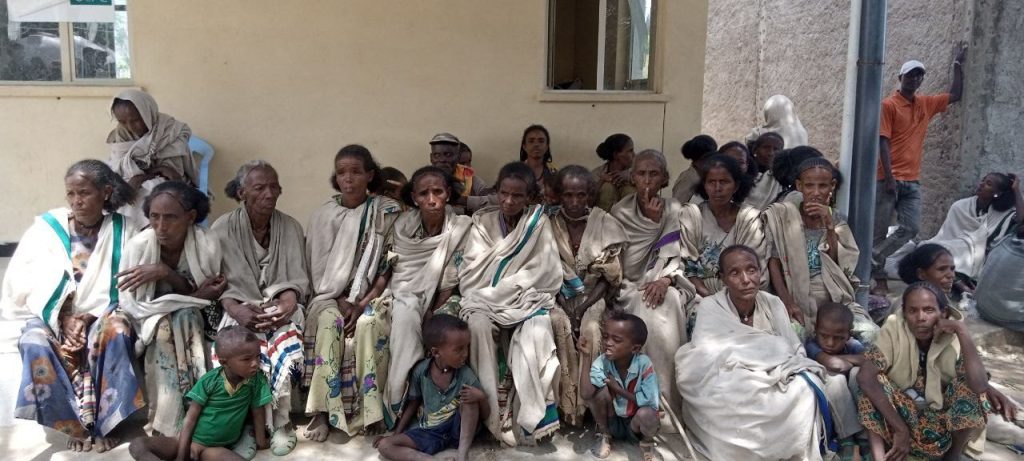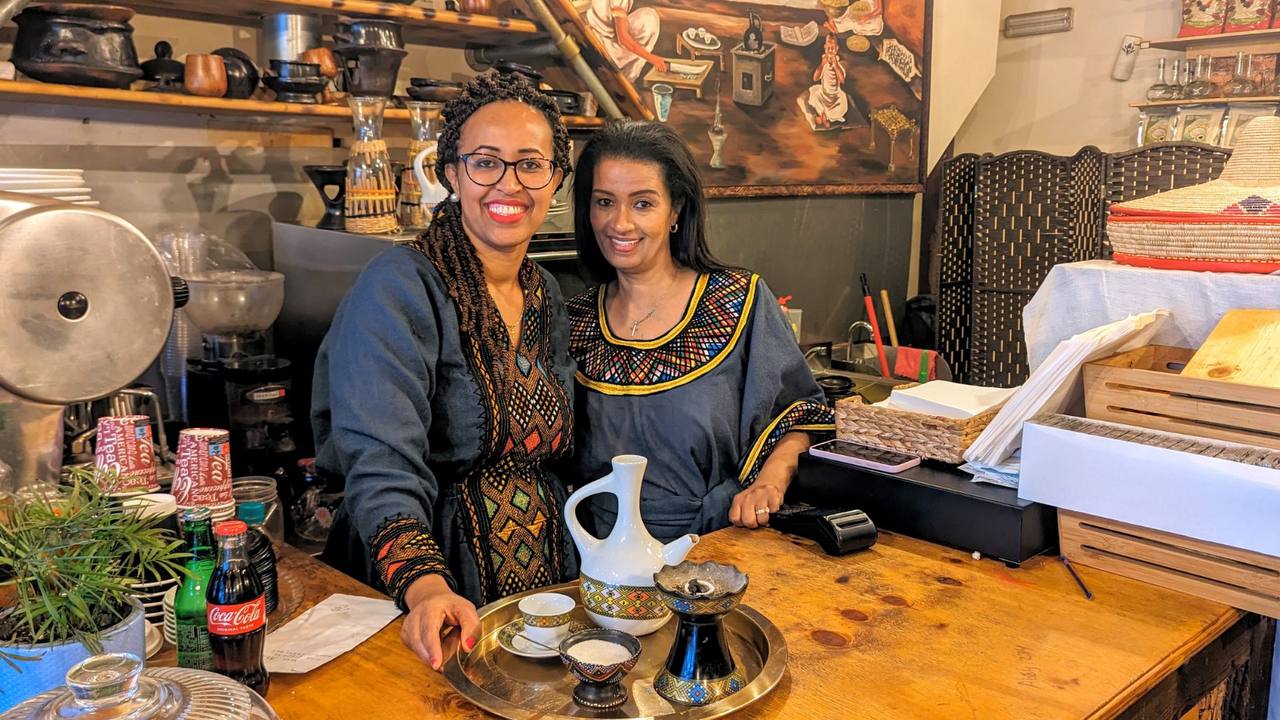Displaced individuals sheltered in the Abiy Addi IDP center, located in the Central Zone of the Tigray region (Photo: Addis Standard Source)
By Molla Mitiku @MollaAyenew
Addis Abeba – The Tigray region is currently mired in political turmoil, driven by a deepening rift within the Tigray People’s Liberation Front (TPLF) between the faction led by veteran leader Debretsion Gebremichael (PhD) and Tigray Interim Administration President Getachew Reda. This political impasse has sidelined the repatriation of nearly one million internally displaced persons (IDPs), further exacerbating the suffering of displaced households.
As a result, IDPs in 99 centers across the region continue to face severe hardships, including critical food shortages, limited access to medical care, and inadequate humanitarian assistance.
The situation is particularly dire in the most densely populated IDP camps in Adwa, Adigrat, Shire, and Axum. These camps are suffering from a critical lack of aid and medical services, with reports indicating a significant rise in hunger-related deaths, especially among vulnerable groups such as children, women, and the elderly.
In an interview with Addis Standard, Wolay Berhe, the coordinator for IDPs in Shire town, revealed that nearly 300 displaced individuals residing in the Hintsad center have died over the past three months.
He stated that at least one death is recorded daily, with some days seeing the burial of two or three individuals at once.
“Mothers, children, and the elderly are particularly vulnerable in this regard,” Wolay explained. “The deaths are primarily due to hunger and lack of medical care.”
The coordinator further emphasized that the severe shortage of water, food, and medical assistance has contributed to the escalating fatalities in Shire’s IDP centers.
“A large number of IDPs do not receive any aid,” he noted. “Of the nearly 500,000 IDPs in Shire and surrounding areas, only 40% have been receiving assistance.”
Nearly 300 displaced individuals residing in the Hintsad center have died over the past three months.”
Wolay Berhe, coordinator for IDPs in Shire town
Wolay also highlighted the lack of accountability in addressing the crisis.
“Despite the rising death toll, no efforts are being made to count, register, or resolve the situation,” he asserted. “This inaction stems from the leadership being embroiled in political crises, prioritizing their grip on power over the urgent needs of the IDPs.”
Hopes for the return of nearly one million IDPs in Tigray, sparked by the November 2022 cessation of hostilities agreement between the Ethiopian government and the Tigray People’s Liberation Front (TPLF), are fading as progress stalls. Although a repatriation program launched in July 2024 briefly raised expectations of recovery for the war-torn region, it was abruptly discontinued after only 56,000 individuals were returned to their homes.
Since the suspension of the program, officials from the Tigray Interim Administration and senior TPLF members have remained largely silent on the resumption of IDP returns or the provision of aid for returnees. The stalled efforts are reportedly tied to a deepening political crisis within the region, fueled by divisions between TPLF veteran leader Debretsion Gebremichael (PhD) and Interim Administration President Getachew Reda.
The internal division arose following the 14th Congress of the TPLF, culminating in the faction led by Debretsion removing Getachew and several other officials from their positions. Debretsion’s group asserted that these individuals “will no longer have the authority to lead, make decisions, or issue directives.”
In reaction, the interim administration under Getachew’s leadership accused Debretsion’s faction of seeking to “destabilize” the region through measures it characterized as a “coup d’état.” The interim administration further cautioned that it would initiate legal proceedings against Debretsion’s faction for allegedly fostering “chaos and anarchy” in Tigray.
In his recent press briefing, President Getachew acknowledged that “the absence of constitutional governance” in Tigray lies at the root of the ongoing challenges.
“Internal divisions within our leadership have further hindered our ability to effectively negotiate and advocate for our people,” he stated. “Rather than addressing their pressing needs, we have been preoccupied with internal power struggles, which have only deepened their plight.”
As the political crisis and instability in Tigray continue to escalate, Berhane Kahssay, the coordinator for more than 65,000 internally displaced persons (IDPs) residing in Adigrat, revealed that nearly 40 individuals have lost their lives in recent months. Among the deceased are 14 mothers and 18 children under the age of 18.
“Camp conditions are dire, with overcrowding, poor sanitation, limited access to clean water, and a severe shortage of food and medical care,” he told Addis Standard.
According to the Tigray Disaster Risk Management Commission, approximately 956,000 IDPs remain in the region without receiving adequate assistance (Photo: AP)
Berhane emphasized that food insecurity remains one of the most urgent challenges confronting the IDPs, leaving tens of thousands in a vulnerable state. “Even those who are designated to receive aid face irregular and insufficient distribution,” he added.
He further noted that medical care for the 65,000 displaced individuals, who originate from Western Tigray, Zale Ambassa, Adiabo, Erob, and Kulo Mekeda, is accessible only to those who can afford to pay for hospital services, while the majority receive no assistance.
“Out of the total 65,000 displaced people in Adigrat, only 65% are receiving assistance,” he revealed. “When those excluded inquire about their omission, NGOs respond that they too are grappling with severe supply shortages.”
Berhane elaborated that the camps are frequently overcrowded, with multiple families forced to share a single shelter or live in confined spaces.
“This overcrowding has led to the rapid spread of diseases such as cholera, malaria, and respiratory infections,” he stated. “The absence of basic healthcare services further exacerbates the already critical health conditions.”
He also highlighted that food insecurity remains one of the most pressing issues faced by the IDPs. “The denial of humanitarian aid to many, coupled with the collapse of local food production, has left tens of thousands reliant solely on their own means for survival.”
A mother of three living in one of the overcrowded and under-resourced IDP camps in Adigrat told Addis Standard that her family is among many households excluded from receiving aid from regional and federal governments, as well as NGOs.
“My family is not on the list of IDPs receiving food from aid organizations,” she said. “As a result, struggling with hunger has become an unceasing part of my life, and the lack of free medical treatment adds another heavy burden.”
Highlighting that 158 IDPs residing in Adwa town died in 2023 alone, Abreha Gebreselema, Coordinator for the Central Zone of Tigray, noted that the death toll continues to rise.
“The primary cause of death is hunger, as many people are being denied aid,” he informed Addis Standard.
According to Abreha, of the 88,900 displaced individuals in Adwa, only 54.2% are receiving assistance.
“This has exacerbated the death toll, particularly among vulnerable groups such as those with chronic conditions,” he explained. “Frustrated by the rising death toll in the camps, the IDPs who do receive aid have contributed 500 birr per household to share with those excluded from aid. However, this cannot save lives or curb hunger-related deaths.”
Desinet Tsegay, coordinator of one of the IDP camps located at Nigist Saba Primary School in Adwa town, emphasized that while local communities have demonstrated solidarity and humanitarian organizations continue to provide assistance, the scale of the crisis far surpasses the available resources.
“While the situation is urgent, political and security challenges hinder any lasting resolution,” he asserted.
Desinet further elaborated that, in addition to the rising death toll, the lack of access to food, shelter, and healthcare has left many IDPs struggling for survival. “Some have been compelled to send their children into the city to beg for food,” he added. AS





